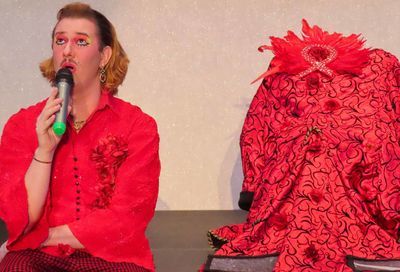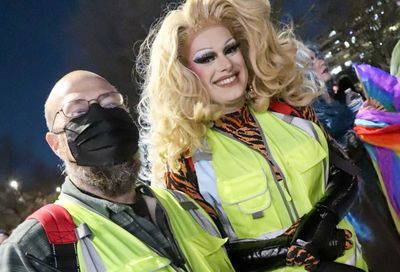Wanda Alston Foundation Named Receiver for Casa Ruby
Receiver will assess Casa Ruby's finances and determine whether the LGBTQ service provider can continue operating.

The D.C. Attorney General’s Office has named the Wanda Alston Foundation as the receiver for local LGBTQ nonprofit, shelter, and community center Casa Ruby, which has come under investigation for alleged financial mismanagement.
On Thursday, D.C. Superior Court Judge Danya Dayson approved a motion setting up a receiver for Casa Ruby in response to a complaint from the office of D.C. Attorney General Karl Racine. Racine’s office has claimed that Casa Ruby violated D.C. law governing nonprofits by mishandling finances over a period of several years.
According to Racine’s office, Casa Ruby — which held itself out as a service provider to homeless LGBTQ youth, LGBTQ asylum seekers, LGBTQ victims of violence, transgender individuals, and Latino and immigrant communities — racked up debts to landlords and vendors that were never paid, failed to pay employees for work done on the organization’s behalf, and left its former executive director, Ruby Corado, as the sole person able to access the organization’s financial accounts.
Racine’s office claims that the board of directors of Casa Ruby failed to exercise oversight over the organization’s operations and financial dealings, thereby allowing Corado — who earned a salary of $260,000 in 2020 — to withdraw funds from the organization’s bank accounts for unknown purposes, including for personal use.
That financial mismanagement, coupled with the loss of some government grant money, is alleged to have led Casa Ruby to shutter its low-barrier shelter and transitional housing programs, leaving clients whom the organization was purporting to serve in the lurch.
Dayson had previously issued an order on Aug. 3 freezing all of Casa Ruby’s bank accounts, which continues to receive grant money from some D.C. government agencies and its PayPal accounts, which accept charitable donations from individuals, in order to prevent any further withdrawals of money. Since 2016, it is estimated that Casa Ruby received about $9.6 million in D.C. government grants, which was earmarked for specific housing or support programs.
In an order issued Friday, Dayson found that there was a substantial likelihood that Casa Ruby, and Corado individually, had violated the D.C. Nonprofit Corporations Act by overstepping their authority or acting contrary to Casa Ruby’s stated mission as a nonprofit.
Dayson also found that Casa Ruby’s outstanding debts, as well as ongoing lawsuits against the organization — filed by landlords of Casa Ruby’s various properties for overdue rent — favored appointing a receiver to manage and oversee Casa Ruby’s finances in the hope of getting it back onto solid financial footing.
After questioning two potential receivers and finding them acceptable during Thursday’s hearing, Dayson gave Racine’s office 24 hours to select a receiver before the court issued its order, with the Attorney General ultimately settling on the Wanda Alston Foundation.
As a receiver, the Wanda Alston Foundation will be tasked with examining Casa Ruby’s finances and determine whether its outstanding debts — including to its current and former employees — can be repaid or resolved without declaring bankruptcy.
The foundation will also determine whether the organization will be able to continue operating and serving vulnerable communities, with a reconstituted board of directors providing significant oversight, and must submit reports to D.C. Superior Court detailing its findings and progress.
June Crenshaw, the executive director of the Wanda Alston Foundation, told Metro Weekly in an interview that she would be seeking to find a lawyer to represent Casa Ruby as the issues concerning the organization’s finances and nonprofit status are worked out.
She also noted that the Wanda Alston Foundation would be consulting experts on how to perform forensic examinations of Casa Ruby’s finances and determine best practices for receivers while being transparent about its actions or decisions in order to restore trust in the organization.
“We are tasked with determining whether there are any assets remaining at Casa Ruby,” Crenshaw said. “And after that determination, we will need to look at how to pay creditors, pay outstanding paychecks to employees, see if there’s some option to satisfy our debt with landlords, and just assess the landscape of the financials, including what resources are available, whether government grants may be stopped because of some compliance issue that we could easily satisfy. That’s the first part.
“The second part is to make a determination, based on that information, whether the programs can be stood up again, whether Casa Ruby can start serving clients, providing housing, and serving all of the folks that they’ve served over the many years, those very vulnerable members of our community who are going without services right now. It’s important for us to figure that out. And if that is the case, then we have to figure out how to identify a board and activate the board again.”
Asked whether bankruptcy would be an option if Casa Ruby’s finances or outstanding debts cannot be resolved, Crenshaw demurred, saying that no one yet knows the full extent of Casa Ruby’s financial standing.
“We don’t have any predetermined outcome,” she said. “We don’t you know what we don’t know. And so at this point, everything’s on the table. I know that there’s a lot of information in the media, and I know that there’s a lot of rumors out there. But until we get a chance to really take a look at the books and whatever documentation there is, maybe have more conversations with staff, that will give use a clearer picture of of what particular direction we should be taking.”
Regarding the possibility of reconstituting Casa Ruby’s board of directors — should it be determined that the organization can be revived — Crenshaw says the Wanda Alston Foundation will follow Casa Ruby’s bylaws and procedures for naming individuals to the board.
“My experience with boards would be that we would get anywhere up to half a dozen, maybe a few more, board members,” she said. “And we would look for a very diverse group of individuals, mostly individuals with governance experience, from financial and legal backgrounds, just to make sure that the things that should be under their purview of oversight are being done in a way that provides the right kind of due diligence. It all depends on the circumstances on but the typical governing board would be expected to review the financials, to sign off on certain actions by the executive director, or by the receiver, in this particular case, until someone can step in and run the organization again.”
Crenshaw hopes to be able to continue operating those non-housing programs that have not yet shuttered, as well as eventually restoring Casa Ruby’s housing programs, if possible.
If some programs are still receiving grant money, she hopes to ensure compliance so that the money from those grants can be used to fund services and compensate employees who have been going for months without pay for the work they’ve done.
“What we do know is our community needs these services,” she said. “Our community needs the beds that we’ve lost. It’s not okay for our youth to be kicked out of the services and the shelters that they were provided.
“We need to make sure that those services come back to our community and serve vulnerable youth and adults who are experiencing homelessness. We know that folks really utilized Casa Ruby for food, for an address, for protection, and for a sense of community — all of the things they were able to provide for a time, just like the Wanda Alston Foundation does for our clients.
“These services are too vital to lose. And so that is our priority, making sure that we keep these programs in our community because we’ve got the greatest need in this city.”
Support Metro Weekly’s Journalism
These are challenging times for news organizations. And yet it’s crucial we stay active and provide vital resources and information to both our local readers and the world. So won’t you please take a moment and consider supporting Metro Weekly with a membership? For as little as $5 a month, you can help ensure Metro Weekly magazine and MetroWeekly.com remain free, viable resources as we provide the best, most diverse, culturally-resonant LGBTQ coverage in both the D.C. region and around the world. Memberships come with exclusive perks and discounts, your own personal digital delivery of each week’s magazine (and an archive), access to our Member's Lounge when it launches this fall, and exclusive members-only items like Metro Weekly Membership Mugs and Tote Bags! Check out all our membership levels here and please join us today!





















You must be logged in to post a comment.